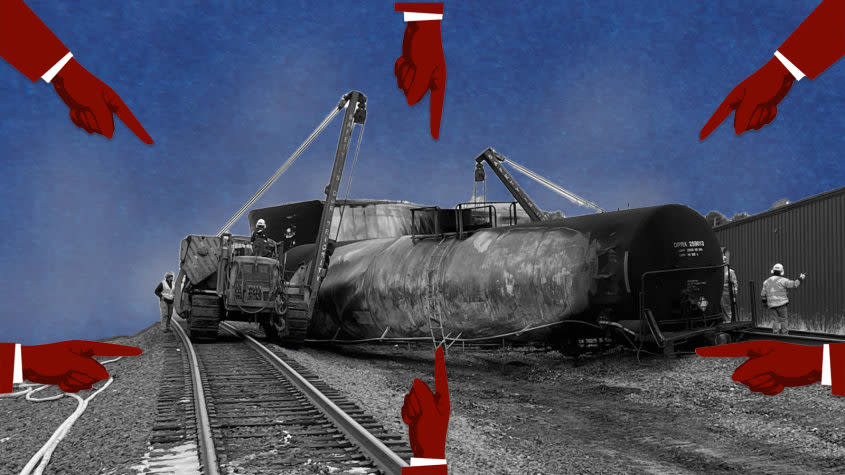The Ohio train derailment 'blame game'

The derailment of a Norfolk Southern train in East Palestine, Ohio, early this month spilled toxic chemicals into a river, and touched off a political battle in Washington. Potentially dangerous pollution got into the air when rail officials released and burned more chemicals to prevent an explosion, leaving residents in fear for their health. Republicans and conservative media accused Transportation Secretary Pete Buttigieg of responding too slowly, using "images of the Feb. 3 wreck — including the flames, plumes of black smoke, and piles of dead fish — to lambaste his oversight of rail safety," Politico said. Buttigieg acknowledged he "could have spoken sooner about how strongly I felt about this incident," and visited the scene Thursday to talk with community members and local leaders.
Former President Donald Trump visited East Palestine Wednesday, beating Buttigieg to the site by a day. Trump, now running for the 2024 GOP presidential nomination, passed out Trump-branded drinking water in a nod to community concerns about the safety of the water supply, and accused the Biden administration of "indifference and betrayal" of the people affected by the accident. Democrats seized on Trump's visit to argue that he shared blame for the disaster, saying he and his fellow Republicans loosened regulations on railway safety, and made it harder for the federal government to respond to chemical spills. Is there any merit in all this partisan finger-pointing?
East Palestine needs solutions, not a 'blame game'
The "toxic political environment" is making the disaster worse, said David Raack, Chris Bowers, and Robert Alexander in The Columbus Dispatch. Instead of indulging in the "blame game," politicians at all levels of government should be working together to clean up the contamination and enact policies to "make rail transport of hazardous chemicals safer." This will take both "strengthening railroad safety requirements and improving transparency with state and local officials and the public."
A particularly "daunting" challenge "is to address residents' current distrust of official statements that their air, water, and homes are safe, and their apprehension about long-term health risks." The "deep polarization" of our politicians is fueling a "lack of faith in government officials," instead of reassuring the public in a time of need. "Citizens need solutions to big problems such as what we now have in East Palestine, not politicians looking to score political points."
Neither side is blameless
"Politicians aren't helping anyone in the town by exploiting the tragedy for their own ends," said The Wall Street Journal in an editorial. Trump "may have made matters worse by suggesting the tap water is unsafe." That undermined efforts by Gov. Mike DeWine and Environmental Protection Agency head Michael Regan to reassure the public by "drinking tap water themselves."
But Buttigieg and others in the Biden administration are just as guilty. They have "contributed to the mistrust with a cookie-cutter progressive narrative," pointing fingers at the Trump administration for rescinding an Obama-era rule on mandating Electronically Controlled Pneumatic brakes on some trains carrying dangerous liquids. Trouble is, there's "no evidence" the technology would have "prevented the derailment," or even applied to this train.
It's fair to call out Buttigieg
The slow response really was part of the problem, said Jim Garaghty in the National Review. An "unusual wrinkle" in this catastrophe was that it wasn't "entirely 'natural' like an earthquake, hurricane, or tornado," so many federal officials believe Norfolk Southern "should pay the entire cost of the cleanup. This led to an initial denial of assistance from the Federal Emergency Management Agency."
FEMA and Gov. DeWine quickly worked it out, and FEMA deployed senior officials to coordinate the early response and work out a long-term recovery plan. "But by then, the damage was done; the initial denial and delay of FEMA assistance quickly created a narrative that an administration that constantly boasts of its empathy and care for ordinary Americans was withholding help when it was needed most."
Public anger has had an impact
The main outcry over the derailment came from the public, said Erin B. Logan in the Los Angeles Times. Residents in the town of 5,000, many of whom were forced out of their homes, erupted in "fury" at a council meeting, demanding a faster response to the disaster. Vinyl chloride, a toxic chemical that can cause liver, brain, and lung cancers, spilled into rivers, killing fish and fueling concerns about whether drinking water supplies would become unsafe. The citizens of East Palestine demanded action.
This week, they started seeing some. Buttigieg "announced reforms, including requiring at least two crew members for most railroad operations, and initiating a safety inspection program focused on routes" for hazardous materials. EPA Adminstrator Michael Regan said federal regulators would lead the cleanup and make Norfolk Southern pay for it. If the company refuses, the government plans to "seek triple the damages from the company." "In no way shape or form will Norfolk Southern get off the hook for the mess they created," Regan said. And Norfolk Southern promised to create a $1 million fund for people in East Palestine. That's a big change for a company that previously spent millions "lobbying the federal government to relax safety rules."
You may also like
A beginner's guide to passive income
5 sharply funny cartoons about Biden's surprise visit to Ukraine

